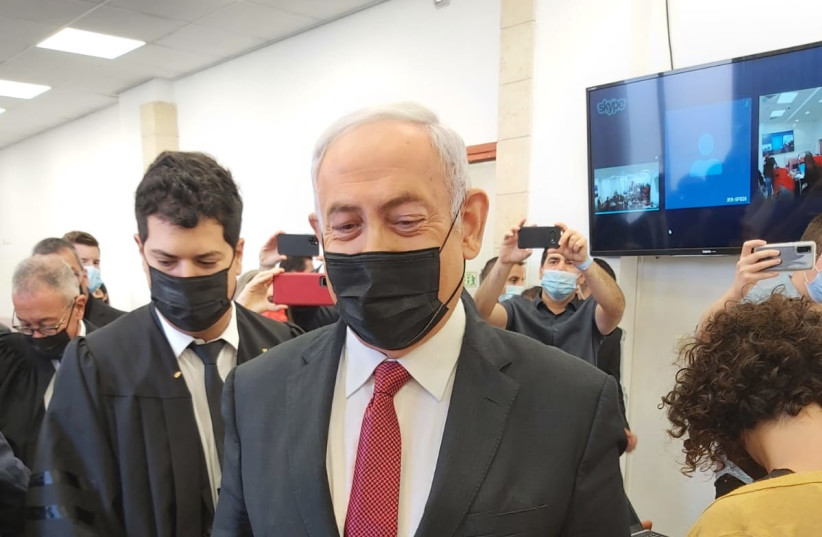Former prime minister Benjamin Netanyahu sat next to his top aide and now state prosecution witness Nir Hefetz while the two edited a video draft of an interview Netanyahu was unhappy with that he had given to Walla, Hefetz testified on Wednesday.
On day three of his testimony before the Jerusalem District Court regarding Case 4000, the Bezeq-Walla Affair, Hefetz referred to the dynamics surrounding an interview Netanyahu gave to Walla on March 11, 2015, ahead of the March 17 election as an example of “Walla being completely enlisted for Netanyahu’s reelection.”
Netanyahu was furious at the Walla reporter for interrupting some of his answers, noted Hefetz, and “exploded” afterward, originally ordering that Walla be prohibited from airing the interview at all.
Hefetz said he was next to Netanyahu when he called Walla owner Shaul Elovitch and ordered him to tell his CEO and editors not to air the interview.
Eventually, then-Walla CEO Ilan Yeshua persuaded Hefetz to convince Netanyahu that the content of the interview was acceptable despite the reporter’s interruptions. Yeshua offered to let them edit the full video draft if Netanyahu would then allow the interview to run.

Hefetz said that their direct editing of the video, including giving specific orders to Yeshua on which portions to cut, “broke all of the rules” of journalism.
Hefetz also testified that Netanyahu “gave a direct order to me” to be in touch with Walla officials to ensure a story on his 2015 Iran speech to the US Congress would be prominently covered by Walla.
Hefetz cited text messages from October 2, 2015, between himself and top Walla officials.
According to the texts with Yeshua, Hefetz demanded that Walla prominently post an article about the Zionist Organization of America criticizing other American Jewish groups for not supporting Netanyahu’s speech criticizing the Obama administration’s Iran nuclear deal.
Hefetz said that the item was in a category of issues that would be “hard to get coverage for in the media. It was not interesting for the [Israeli] media. This would only get in with strong pushing. It was internal American issues that were not interesting to the [Israeli] editors and [Israeli] public.”
Hefetz explained that the only reason Walla covered the speech was to advance control of Walla media coverage for favorable communications policy within the framework of the Bezeq scheme.
While the defense highlighted that Hefetz said he did not remember the specific conversation he had with Netanyahu, “No one else would give me orders about issues like this,” Hefetz said. “Everyone got this information from Benjamin Netanyahu. This is his expertise. I carried out these orders with zero discretion. What he ordered, I carried out to the letter.”
His testimony also addressed texts from November 2, 2015, between Hefetz and Yeshua and Walla-Bezeq owner Shaul Elovitch, about a story that Netanyahu wanted covered to divert public attention from a state comptroller’s report about the Prime Minister’s Residence scandal.
That scandal related to a number of issues connected to whether Sara Netanyahu had fraudulently misused state funds.
She was eventually convicted in a plea bargain on one of the charges, but was given only a fine with no jail time.
Hefetz testified that he remembered Netanyahu making presentations to the entire Likud Knesset list on how they should respond to questions on the Prime Minister’s Residence scandal.
Hefetz wrote Yeshua and Elovitch that he wanted Walla to give prominent coverage to the article that undermined the state comptroller’s report (and therefore boosted Netanyahu), and that the request came from “my friend.”
The reference to “my friend” was a known code between him, Yeshua and Elovitch for Netanyahu, Hefetz said.
Once he mentioned his friend, “there was not even a one-in-a-million chance that our request would not be fulfilled,” Hefetz said. “What we requested, they would do – for Benjamin Netanyahu.”
Furthermore, Hefetz said that he specifically remembered Netanyahu’s direct handling of the issue.
According to Hefetz, pushing the state comptroller’s criticism of Netanyahu and his family out of the news “was of giant strategic importance in the days leading up to the election.”
Hefetz said Netanyahu thought his electoral chances were directly linked to getting the public discourse to re-focus on his national security expertise, and away from negative debates on his and his family’s ethical problems.
Hefetz said that Netanyahu had given him a direct order to get Walla coverage from Yeshua of Netanyahu’s initiative to have the public weigh in on two final candidates that he wanted to add to the Likud election list.
One jarring recording that the prosecution played had Hefetz talking with Yair Netanyahu about a negative story (and according to him a misleading one) in Haaretz for which the former prime minister’s son wanted the outlet to apologize.
The recording portrayed Yair as practically assuming the role of a prince who believed he could order Hefetz to make any media outlet do whatever he wanted.
At one point, Hefetz even said to Yair, “Haaretz is not like Shaul Elovitch. They are not afraid of you.”
In trying to connect Yair’s activities to his father’s, the prosecution also played a recording of Benjamin and Yair Netanyahu ganging up on Hefetz over a media item that he had not had removed from the Internet.
Hefetz also told the story of what led Netanyahu to make the video urging Likud voters to vote in high numbers because “Arabs voters are heading to the polls in droves.”
Hefetz was trying to show how obsessed and panicked Netanyahu was about the media before the 2015 election.
The former top aide has been testifying daily since Monday.
